 |
 |
 |
 |
 |
 |
 |
 |
 |
First Division - Goodison Park - 43,605
Scorers: Bell
Everton: Rankin, Rees, Brown, Gabriel, Labone, Stevens, Temple, Young, Pickering, Vernon, Morrissey
Leeds United: Sprake, Reaney, Bell, Bremner, Charlton, Hunter, Giles, Storrie, Belfitt, Collins, Johanneson
Certainly, the reputation of the club was well established by the end
of 1964. During October, the Elland Road crowd had struck up with a chant
of 'Dirty Tottenham … Dirty Tottenham', ironically mocking the castigation
that United regularly suffered, as Spurs had four players booked in a
3-1 defeat. Whatever the truth, there was one specific day in the late autumn of
1964 that ranks very prominently in the development of the legend - Leeds
United's clash with Everton on 7 November 1964 has gone down in the annals
of English football as one of its most notorious confrontations. It took
both sides to generate the heat that ruined the day, but it certainly
cemented the reputation of the Whites for provoking controversy and rancour. It's a moot point as to whether Don Revie set out with the deliberate
intention of his men kicking their way to success. The man himself always
strenuously denied any such thing, choosing instead to lay the blame at
the door of opponents, referees, commentators … anybody outside the confines
of Elland Road would do, as long as it wasn't his charges who took the
blame. However, there are simply too many examples of the Yorkshiremen
being involved in appalling scenes for all his protestations of innocence
to carry much credibility. Jack Charlton provided a telling
hint of the Elland Road approach, whilst denouncing it, in his 1996 autobiography:
'We made a lot of enemies in that 1964/65 season. I remember lying on
the treatment table in the Leeds dressing room with one of the young lads,
Jimmy Lumsden. He was talking about a reserves match the night before,
and he told me that he had gone in over the top of the ball to a guy who
had then had to be taken off. "I gave him a beauty," Jimmy said.
Don murmured something approvingly. "Jimmy," I told him, "Jimmy,
you live by the sword, you die by the sword. That guy might some day play
against you again, he will remember you and he might just go over the
top to you when you're not expecting it. You might finish up breaking
your leg."' Irish playmaker Johnny Giles earned himself a darker name after his arrival
at Elland Road. He was unequivocal about the reality of the professional
game: 'You had to establish a reputation that would make people think
twice about messing with you … I have certainly done things on the football
field then that I am embarrassed about now, but one has to put them into
the football climate that existed then. It was a different game then,
much more physical than it is today - vicious even - and people like Bobby
Collins and myself were targets … Now you either took it or you responded
to it, and Bobby and I responded to it … you had to get respect in the
sense that people could not clog you without knowing that they would be
clogged back. People might say, 'Oh, that's not right - it's not sporting,'
but that's the way it was, a fact of life.' The jutting-out chins, brash arrogance and shameless attitude of United's
players brought out the worst in others, provoking them to outdo Leeds
at their own game. As often as not, uptight opponents would forget to
play football in their eagerness to fight fire with fire and that usually
spelled their downfall: United had gained the upper hand, earned the right
to dictate terms and usually finished off their opponents with equal measures
of skill and brutality. It mattered not which weapon was required, Revie's
men were as adept with both bludgeon and rapier. The mood in the autumn of 1964, as Leeds made their way in football's
top flight, was uncompromising. The paranoid siege mentality that so often
characterised Revie as a manger came spilling over when he heard the news
that the Football Association had named his beloved players as 'the dirtiest
side in the country'. The FA were determined to take firm action against
the game's worsening discipline and the Association's official journal,
the FA News, carried an article in August examining the disciplinary
records of its membership. Leeds United were highlighted as the Football
League club with the worst record for players cautioned, censured, fined
or suspended. United reacted angrily to the article, pointing out that it was not the
first team, but the junior sides, that were responsible for the bulk of
the numbers. Revie told Phil Brown of the Yorkshire Evening Post:
'We did not have a single first team player sent off last season and we
had only one suspended, Billy Bremner, after a series of cautions, which
is a lot more than many clubs can say. The majority of our offences were
committed by junior second team players or boys. For that I blame the
tension which permeated the whole club in the long and hard drive for
promotion in a very hot Second Division. It was a time of very great strain
for us all, and the club spirit being as wholehearted as it is from top
to bottom.' United prepared a formal response to the FA, warning ominously: 'We Revie feared an over reaction from the teams that United played. Certainly,
that was how it worked out in the fierce clash at Goodison Park. Leeds were the form team of the two, sitting fourth in the table, on
the back of four straight victories. Everton were eighth, without a win
in a month. They remained a class act, though, and were eager to put United
in their place. John Moores, after making a fortune with the Littlewoods organisation,
took over as chairman of the Merseyside club in 1958 and financed their
rebuilding plans under new manager Harry Catterick, appointed in 1961.
The Toffeemen won their first title for 24 years in 1963, twelve months
after Bobby Collins forsook Goodison for Elland Road. They were now one
of the country's finest teams, boasting such talent as centre-half Brian
Labone, Dennis Stevens (who took Collins' place in the team after arriving
from Bolton), Scottish international right-half Jimmy Gabriel, goalscorer
Roy Vernon and the fans' favourite, 'The Golden Vision', Alex Young. Everton had a number of players unavailable for the game, including Scott,
classy utility player Brian Harris and Scottish international full-back
Alex Parker. United had their own injury worries and former England centre-forward
Alan Peacock had missed the entire
season. Young Rod Belfitt, just turned
19, continued to deputise up front, scoring three goals in six appearances
prior to the game. Everton's players expected a battle and were patently aware of United's
reputation. Indeed, only those cast adrift in the Arctic for the preceding
two years could have been unaware of their record - the autumn had seen
Leeds implicated in several highly controversial moments. Richard Ulyatt of the Yorkshire Post: 'On 12 September, Gibson
of Leicester City was sent off the field when playing on Leeds United's
ground … On 17 October, four Tottenham players had their names taken by
the referee … On 31 October, Badger, the Sheffield United full-back, was
sent off … Sheffield were so incensed that their programme comments for
last Saturday's home match against Chelsea included passages they may
eventually regret. It described the Leeds match as a "travesty of
soccer". It was said "Badger was fouled and needlessly hacked"
(a free kick was awarded against Sheffield, not Leeds) and it was added:"'It
is significant that this incident was not the only flare up there has
been at Elland Road in recent weeks. Further comment is unnecessary."
That was comment by a club not the press.' The atmosphere was tense in Liverpool that day. Goodison Park has never
been exactly placid; Jack Charlton rated the Everton crowd as 'the worst
before which I have ever played … there always seems to be a threatening
attitude, a vicious undertone to their remarks.' United had tangled with Everton in the FA Cup nine months earlier, and
had taken them to a replay before going out in a ferocious clash. For
many of his former team mates, memories of Bobby Collins' readiness to
take liberties were still fresh, and they awaited Leeds United with a
mixture of anxiety and antagonism. Life with the Yorkshiremen always carried
menacing undertones and Everton were on a short fuse, fully wound up and
all ready to go. The game was only seconds old when Everton centre-forward Fred Pickering
was fouled Rob Bagchi and Paul Rogerson: 'Jack Archer of The People called
it a "spine-chilling" game, one littered with a long procession
of fouls, the type Charlton described as "sneaky things - going in
over the top, boots hanging in late". In only the fourth minute Giles
and Sandy Brown, the Everton left-back, had jumped into a tackle just
outside the Everton penalty area. Brown, incensed by the vigour of Giles'
challenge and subsequently complaining of "stud marks in the chest",
got up and threw a left hander at Giles and was predictably sent off.
From then on the frenzied atmosphere saw both sets of players flying into
tackles with the crowd baying for retribution.' Some extraordinary things went on that afternoon and there were no prisoners
taken by either side. The temperature climbed in the white-hot cauldron
of Goodison - professional footballers forgot this was a sport and instead
pitched themselves into fully fledged combat. Somewhere amidst the fearsome conflagration, though, there was actually
a little football being played and after fifteen minutes Leeds took a
priceless lead. They won a free kick far out on the right wing. Bobby
Collins swung the ball high into the heart of the Everton goal area. Full-back
Willie Bell came running up at speed
from far out to find space in the box and met the ball perfectly. His
header flashed into the net with the home defence helpless. It was a well-worked
goal and evidence of the defender's willingness to supplement the attack. The home crowd had been incensed by Brown's dismissal and now they became
uncontrollable. Any Leeds player who was foolish enough to come within
throwing distance ran the risk of being struck by missiles - for Gary
Sprake there was no hiding place as his goal was pelted mercilessly by
a hail of coins throughout the game. Things came to a head after 36 minutes. Bell and Everton right winger
Derek Temple were following the flight of the ball and seemingly unaware
of each other. They collided at full speed, laying each other out. That
was the signal for the crowd to get completely out of hand. While Bell
and Temple were receiving attention, missiles rained down on the players
and the trainers attending them. Les Cocker and referee Ken Stokes were
struck by flying coins. Desperate to quell a potential riot, Stokes promptly decided on drastic
action - he ordered both sets of players to the dressing rooms to give
them and the crazed crowd time to cool off. It was some minutes before Bell came round sufficiently for Les Cocker
and his team mates to carry him off, while Temple required a stretcher. The referee laid down the law to the players during the halt in proceedings.
Jim Storrie: 'He came into each team's
dressing room and said that if we didn't stop kicking each other and start
playing football, he would report us to the FA.' The game resumed after a ten-minute gap 'on a pitch festooned with the
cushions and rubbish thrown by the crowd … amid a storm of jeers and catcalls'.
Both Bell and Temple were back in action, seemingly none the worse for
wear. The break did little to soothe the fury of fans or players. After the resumption, some of the tackling, particularly by Norman Hunter
and Roy Vernon, was brutal in the extreme and the match continued to seethe
with an undercurrent of barely concealed aggression. Hunter was booked,
and the referee lectured Bremner, Collins, Vernon and Stevens for dangerous
play. A number of players were fortunate to avoid joining Brown in the
dressing room. Bobby Collins became more dominant, seemingly relishing the kind of hostile
environment in which he thrived. Ian W Guild: 'Collins stood out on his
own as the complete footballer. His generalship and shrewd distribution,
together with his willingness to work at both ends of the field, guaranteed
Leeds the lion's share of the ball.' He ensured that United made the most
of their man advantage, exhorting his troops to stretch the game and force
Everton to work hard for any possession. Jack Charlton proved what a resolute and accomplished stopper he had
become and received steadfast support from Bremner, Hunter, Bell and Reaney.
United manfully resisted the Merseysiders' closing assault as they went
all out for an equaliser. Everton were kept at arm's length as United
squeezed out a 1-0 result. The Yorkshiremen had to contend not only with
some breakneck football from the home side in the closing minutes, but
also with fierce antagonism from the 40,000 Scousers in the crowd. Collins said later: 'It was diabolical … they blamed us, yet some Everton
players were going over the ball time and time again. But the referee
is in control of the game … it is up to him. When Sandy Brown got sent
off, it was like a fuse on a bomb being lit … it really got a bit nasty
and brutal. There were a lot of hard challenges that day. But you can't
turn the other cheek or they'll kick you.' Bagchi and Rogerson: 'After the game an angry, booing crowd had to be
dispersed by mounted police from the streets surrounding the stadium.
From the safety of their coach, which had to withstand another barrage
of missiles, the Leeds players must have reflected on the ill feeling
that had almost overwhelmed them. How far had they been responsible for
provoking it? … When faced by teams willing to stand toe to toe with them,
Leeds always tended to incite the wrath of opposition supporters because
to them the game would appear one long succession of Leeds' fouls. In
fact, the foul tally in the Everton match shows Leeds committing twelve
to Everton's nineteen - but it was the manner in which Leeds carried themselves.
United never seemed to care about their reputation, they never retreated
when the opposition attempted to turn the tables and they knew just how
far to wind up the opposition without winding up the referee. It didn't
matter if the match statistics exonerated them; they were such perfect
villains.' The frightening scenes provoked some predictably hysterical press coverage. The Times: 'For the first time in the history of the Football
League both sides in a match on Saturday were ordered off the field for
a space of five minutes to allow the tempers of both the crowd and the
players to cool … Such an event has occurred frequently enough abroad
... It happened even here a year ago when the referee abandoned an international
at Hampden Park as the Austrians got out of control against Scotland.
It happened, too, lower down the supposed social football scale in 1959
when the teams of both Dartford and Gravesend were given communal marching
orders. Those were isolated incidents within these isles, roundly condemned
at the time. But for supposedly civilised senior British players now to
follow suit against each other is something new and menacing. The image
of the game, already damaged in other ways, cannot stand much more of
this. 'The front line of battle now was Merseyside. Goodison Park has already
gained an unsavoury tribal reputation for vandalism. Leeds United, too,
more recently have earned black marks for ill temper on the field. The
marriage of these two dangerous elements sparked off the explosion. But
the whole business goes much deeper. At a time of national remembrance
one remembered the old days when play certainly was equally rough, if
not physically rougher. Yet now the modern sophisticates can be more sinister,
more subtle in their methods. The high rewards at stake, the financial
incentives, have brought new, more savage pressures. 'For all those who love the game this brings a deep sense of pain. But
it is no use burying sensitivity in the sands. Stern, practical steps
must be taken now to cure the malaise of a minority that can spread dangerously.
Grounds should be closed; players should be soundly punished where it
hurts most - in their pockets.' Don Revie fell back on his favourite ruse of pointing the finger at others:
'After the incidents of this weekend I must defend my club and my players
after all the bad things that had been said about them. I feel it started
last season when we were in the Second Division when we were tagged as
a hard, dirty side by the press. 'I am disgusted by these attacks on us and I ask that we be judged fairly
and squarely on each match and not on this unfair tag that we have got
… we The incidents at the game raised the hackles of football's establishment
- the patriarchal, cigar-smoking president of the Football League, Barnsley's
Joe Richards, hinted at firm action to follow: 'I think the time has come
to investigate the whole question of these ugly scenes and rows. They
are bringing a bad image to football ... Something must be done and we
must find out the causes. We shall certainly look at it from the bonus
point of view and find out whether that is causing the trouble. Competition
is healthy and we must have promotion and relegation, but things seem
to be getting too keen. It may be that players are getting too much money
for points. It is all very disappointing, because players are getting
good wages compared with people in industry, but this trouble is happening
too regularly.' Richards was the man forced to back down by PFA chairman Jimmy Hill over
football's maximum wage in January 1961. Previously, a maximum of £20
a week in season and £17 in the summer had been the rule - Hill
brought a long and protracted dispute to a head by threatening a players'
strike, forcing the Football League and the clubs to relent. Richards served as League President from 1957 until 1966. League
secretary Alan Hardaker wrote of him: 'Joe Richards was a small, dapper
man, a tough old bird who learnt the business of life in the Yorkshire
coalfields. His only language was honest Yorkshire but he seemed able
to make himself understood no matter what country he was in. The impression
he left was always lasting and favourable.' Richards, however, had been clearly scarred by the memory of the players'
revolt and was convinced that the growing preoccupation with money was
at the root of all football's ills. He had earlier used his own resources
to pay for the Football League Cup trophy to be manufactured when Hardaker
came up with the idea for the new competition in 1960. In the end, despite all of Richards' vehemence and ire, the only punishment
meted out by the FA was against Everton. Sandy Brown was suspended for
two weeks and Everton were fined £250 for the behaviour of their supporters.
United chairman Harry Reynolds noted chirpily, 'I can make no comment,
for the decisions do not concern us.' The events of November 7 cemented the reputation of Revie's United in
the minds of many for years to come - they were a bunch of thuggish yobs
who would stop at nothing to win a football match. While there was certainly
some truth in that conclusion, Everton were the greater offenders on the
day, and the FA's criticism three months before did much to create an
atmosphere of tension and a readiness to 'get your retaliation in first'. Leeds came out of the game vilified and unloved, pilloried for their
readiness to remove the gloves. They had ruffled the feathers of the football
hierarchy and were in vigorous pursuit of an improbable League title.
For a team who had never come within a country mile of any major honours,
the success of the Leeds juggernaut in securing points was much more important
than being loved … Don Revie would look back in later years and wince
at the approach, but at the time his judgement was swayed by the astonishing
success of his men's physical and mental aggression.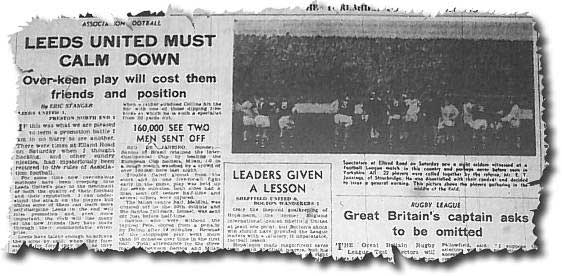 There is no way of pinning down exactly when the infamous myth of
'Dirty Leeds' began: it could have been the day in early 1962 when Glasgow
street fighter Bobby Collins answered
the call of Don Revie, thereby importing
an aggressive streak the size of the M1 into Elland Road; it might have
been over Christmas 1963, when United clashed twice with promotion rivals
Sunderland and players on both sides indulged in onfield thuggery of the
worst kind; or perhaps the month before, when United entertained third
placed Preston North End and the aggression was so intense that the referee
halted the game after an hour to give the players a final chance to calm
down and get themselves under control.
There is no way of pinning down exactly when the infamous myth of
'Dirty Leeds' began: it could have been the day in early 1962 when Glasgow
street fighter Bobby Collins answered
the call of Don Revie, thereby importing
an aggressive streak the size of the M1 into Elland Road; it might have
been over Christmas 1963, when United clashed twice with promotion rivals
Sunderland and players on both sides indulged in onfield thuggery of the
worst kind; or perhaps the month before, when United entertained third
placed Preston North End and the aggression was so intense that the referee
halted the game after an hour to give the players a final chance to calm
down and get themselves under control.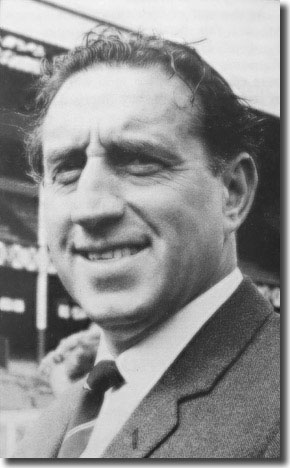 would also maintain that the Dirty Team tag, which was blown up by the
Press, could prejudice not only the general public but the officials controlling
the game, and to put it mildly, could have an effect on the subconscious
approach of both referee and linesmen, to say nothing of the minds of
spectators, especially some types who are watching football today. It
could lead to some very unsavoury incidents.'
would also maintain that the Dirty Team tag, which was blown up by the
Press, could prejudice not only the general public but the officials controlling
the game, and to put it mildly, could have an effect on the subconscious
approach of both referee and linesmen, to say nothing of the minds of
spectators, especially some types who are watching football today. It
could lead to some very unsavoury incidents.'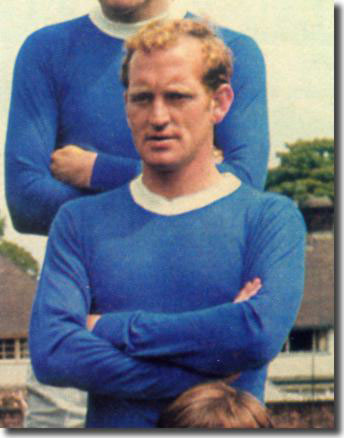 by Billy Bremner. Seconds later Jack Charlton suffered a similar fate
at the hands (or feet, rather) of an opponent. That was that - the battle
lines were drawn: this was going to be a tasty affair.
by Billy Bremner. Seconds later Jack Charlton suffered a similar fate
at the hands (or feet, rather) of an opponent. That was that - the battle
lines were drawn: this was going to be a tasty affair.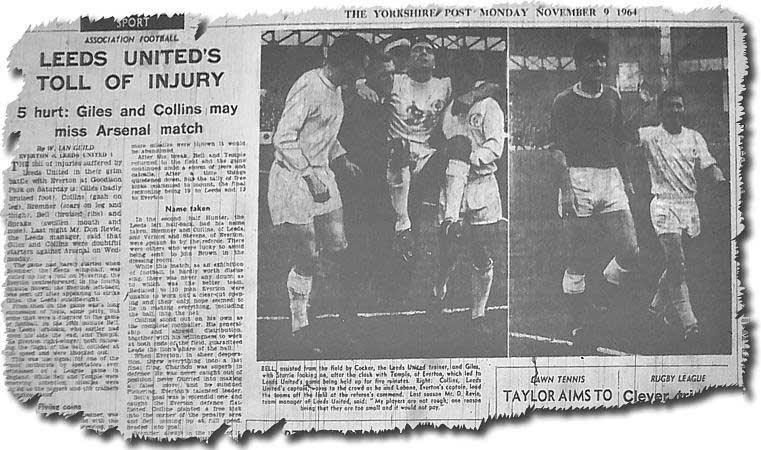 For
a time, nobody knew whether the game had been suspended or abandoned.
Shortly, the loudspeakers announced that play would restart in five minutes,
although Stokes warned that the match would be called off if more missiles
were thrown.
For
a time, nobody knew whether the game had been suspended or abandoned.
Shortly, the loudspeakers announced that play would restart in five minutes,
although Stokes warned that the match would be called off if more missiles
were thrown.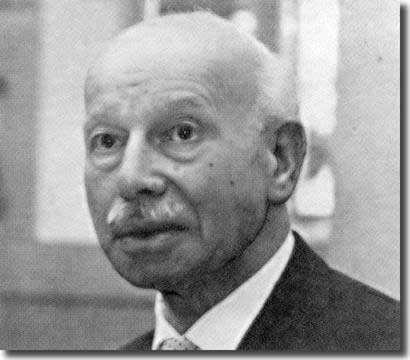 were
wrongly labelled by the press and then by the Football Association. The
result has been that opposing teams have gone on to the field keyed up,
expecting a hard match. I think the number of opposing players sent off
in our matches proves it.'
were
wrongly labelled by the press and then by the Football Association. The
result has been that opposing teams have gone on to the field keyed up,
expecting a hard match. I think the number of opposing players sent off
in our matches proves it.'